Fraternus for boys and Fidelis for girls meet weekly at the Cathedral of the Most Sacred Heart of Jesus
By Dan McWilliams
Two new ministries in the Diocese of Knoxville have been started for boys and girls in grades six through 12, and each is designed to form the young people into virtuous men and women through the mentorship of adults Fraternus (“brotherhood”) is the program for boys, and Fidelis (“loyalty”) is the program for girls.
Both Catholic groups meet from 6:15 to 8 p.m. Sundays at the Cathedral of the Most Sacred Heart of Jesus, the boys in the youth room and the girls in the Shea Room.
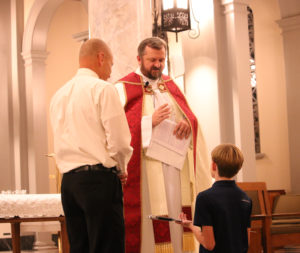
Each Fraternus boy held a sword as Father Martin Gladysz blessed them during the initiation ceremony.
On Nov. 17, the youth in the programs took part in an initiation ceremony at the cathedral. Boys held a sword as they officially committed to the Fraternus program, while girls were given a bracelet with a Miraculous Medal. All of the youth received a blessing from Father Martin Gladysz, who presided.
Priscilla McKinney, the national director of Fidelis, is a parishioner of Sacred Heart.
“Both Fraternus and Fidelis are brother-and-sister programs,” she said. “We work together as a team with each of the programs to fulfill this mission of raising young women to be the holy women that God’s calling them to be and young men to be the holy men that God’s calling them to be.”
Mrs. McKinney spoke of what makes each program different from others.
“The Fraternus program really works with men and showing men what it really looks like to be the owner of their faith and what it means to be a real Catholic and how that in itself is a challenge in the world today, and what that looks like in the eyes of God and how to really fulfill their vocations to be leaders of their households, to be leaders of our society,” she said.
“The girls program speaks more to the feminine heart. It speaks more to women understanding the beauty of their femininity and how that relates to the role that’s going to play in society and how they themselves are a huge influence in our world. Both programs are meant to build up the youth as a whole. We can’t really have one program without the other program to complete each other.”
Mrs. McKinney has a son, Shannon, in the Fraternus program. “He’s in seventh grade, so he’s 12 years old. He loves it,” she said.
“We’re new to this area. We had a program at our last parish in Washington state. My biggest motivation for trying to bring the program here was yes, to impact the youth in the Knoxville Diocese as well, but really it’s because my son was begging for it. He was exposed to it. He saw that authentic manhood and how you can only really express that and only really live that and learn that in the brotherhood that Fraternus provides for him. That’s attractive to him.
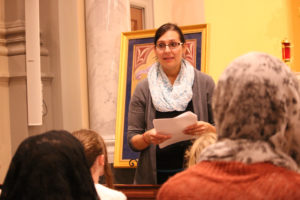
Priscilla McKinney, a parishioner of Sacred Heart, addresses members of the ministry before the initiation ceremony.
“I believe it’s attractive to all boys to be able to learn about their faith and be who they are without having to worry about girls. And vice versa, the girls are able then to be themselves, without that pressure of boys present they can really open up. My son is involved and he absolutely loves the program. He is a huge fan of The Ranch, the summer program that Fraternus has each year. It’s a summer camp essentially. It’s just the boys. They hear motivational talks. They go to adoration. They do really manly, adventurous things. It’s something that he absolutely loves. He loves getting together with his other friends, friends who are male.”
Each meeting at Sacred Heart follows a similar structure, Mrs. McKinney said.
“They start out with social time, and that’s essential to the program as well,” she said. “The program has three pillars: the mentorship, the brotherhood and sisterhood aspect of it, and the virtues. The first portion is the social time. After that we bring everyone together with a prayer.”
A game follows the prayer.
“It’s more of a structured game,” Mrs. McKinney said. “For the boys, they call it comp time, competition time. The boys play dodge ball or what they call Bosco ball from the patron of the programs, St. John Bosco. The boys play this competition or do something very active and get them in their element and get them to let loose and be wild and crazy, and then the girls something as well to get them to let loose and to have fun and break down those walls and barriers. Mentorship is a huge part of the program. Whatever the girls are doing, the mentors who are there, the adult women and the adult men, they are just as involved. They’re not sitting back and watching; they’re in it and are playing the games with the youth. That’s a very important aspect of it.”
The boys and girls then watch a movie clip.
“It’s typically from a secular movie. The movie demonstrates the virtue we are studying for the week,” Mrs. McKinney said. “The reason that we try to pick mostly secular movies is because we want the youth to recognize these virtues we are talking about and learning about that apply to our faith, but we want them to recognize it in the secular world. We want them to be able to see it and be able to identify that that is someone living virtue or not living virtue and to be able to know what that looks like and apply it to their faith so they can know how to apply it to their life as well.”
A “King’s message” follows the two- to three-minute movie clip.
“It’s what Our King, Christ, wants us to gather from this clip,” Mrs. McKinney said. “In this King’s message, a mentor will get up and talk to the boys or girls about what that virtue was in the clip and connect it to their lives and essentially commission them to live out this virtue in their lives and give them a concrete example of how that can be done.”
The meetings then break into small groups divided by age.
“This is when they’re really going to get into the meat and heart of the lesson,” Mrs. McKinney said. “This is where the discussion will have a different effect on age groups. Each group has its own book. When they’re in the small groups, the book goes through a verse from the readings from Mass that week and has small-group questions for them to discuss. It has quotes from saints referring to that virtue and then a challenge for the boys to live out that virtue in the coming week. For the girls it’s called an invitation; they’re invited to live out this virtue in a very particular way. Then at the end of the night we close with compline. We pray that together, either in a group separately or as one with the boys and the girls.”
Each group has a mission.
“The mission of Fidelis is forming girls—heart, mind, body, and soul—into a sisterhood of disciples through the witness of Catholic women,” Mrs. McKinney said. “For the boys it’s mentoring boys into virtuous Catholic men. We want to raise the future generation to be a generation that lives out Christian virtue. They’re going to be influenced by society—that’s just the nature of the world that we live in—but which voice is going to be louder? Which one is going to have the most impact on them? It’s a necessary force; it’s a necessary battle that we’re waging here. It takes on a different level when they are being challenged throughout their week to live a virtuous life. It’s going to have a more lasting impact.”
The brotherhood and sisterhood they are experiencing on a weekly basis—“that’s going to be the group of people that holds them accountable to live a virtuous life. That’s going to be the group of people that as they grow and as they mature and as they are no longer in these programs, that’s going to be the people that they call on when they’re having trouble and they’re facing temptations and they need that support in prayer or in guidance: other boys, other men, other girls who are going through the same troubles,” Mrs. McKinney said.
“They can hold each other accountable, and they can lift each other up. They can be that strong foundation. These girls ideally and essentially will have been with each other for six years, if they go through the program from sixth through 12th grade. They will have a good, solid, firm friendship. That friendship isn’t going to just dissipate once they’re out of the program. That’s something that’s going to last with them for quite a while.”
The girls also have a national summer camp: Inspire.
“It’s a weeklong camp,” Mrs. McKinney said. “We have sisters from Nashville, the Dominican Sisters of St. Cecilia, they’ll come and they’ll join us. We have a chaplain. We have Mass every single day. We have adoration. We have confession. It’s just a way that they can see that there are other youth around the country who are all living and striving to live a life of virtue just like they are.”
The Fraternus program places a major emphasis on fatherhood.
“It’s an epidemic in our world today. There is this lack of fatherhood, essentially,” Mrs. McKinney said. “This is where the differences come into play with the programs. With boys, they need fathers. They need someone to show them how to live their life. They need someone to show them what it means to be a man. [Fraternus] really gives the opportunity for the men to see what it’s like to live a Catholic life as a man.
“For the girls, we as women are not able to see what motherhood is really supposed to look like. We have the beautiful example of Our Lady, of course, but as a culture we’ve shifted from the stay-at-home mom type of situation, and moms are kind of forced into the workplace, and that’s OK, there’s nothing wrong with that. It’s just a matter that they are not necessarily able to spend that time with their daughters to show them what it is really like to be a mother and to raise them in that faith and to help their daughters see the value of being a woman, the value of their femininity, the value of what God has gifted them, which is the power to be a mother.”
Father David Boettner, rector of the cathedral, is “very supportive” of the two programs, Mrs. McKinney said.
“He and Deacon Walt [Otey] have given us space to meet. They’ve allowed us to run ads in the bulletin and to get it going,” she said.
Mrs. McKinney has been married to John McKinney for 14 years. They have four sons and a daughter.
“My husband has actually taken on the role of leading the Fraternus program here, without any prompting on my part,” Mrs. McKinney said. “He volunteered to that because it was always his dream to be involved in a boys program with our children. With our oldest son being Fraternus age, he felt called to make sure that there was a strong leader to keep these programs going because we have four sons coming up the line, and we want this for our children. More than anything, we want holy children for ourselves and for the community.”
The programs have a certain lasting impact for many of the youth once they reach adult age.
“There has been a huge witness to these programs through the amount of vocations that come out of these programs,” Mrs. McKinney said.
“From the Nashville Diocese alone, there are about 20 seminarians currently who have come through the Fraternus programs, and they attribute much of the reason they’re in seminary and the fact that they would even discern being a priest to the influence that Fraternus has had on them. On the Fidelis side of things, there have been several girls from different chapters who have gone on to seek consecrated life.”
Beth Parsons, office manager for the diocesan Office of Vocations and Smoky Mountain Deanery coordinator of Youth and Young Adult Ministry, has a daughter, Maggie, 12, in the Fidelis program and a son, Riley, 14, in the Fraternus program.
“I think it’s really fantastic,” Mrs. Parsons said. “I’ve already seen just in the short time we’ve been meeting how it’s building some relationships with them and the mentorship with the older women and the men who are mentoring. It’s been an awesome experience for both of them. They both really look forward to coming back each week.”
More information for both groups may be found at: www.fidelisonline.org and fraternus.net.

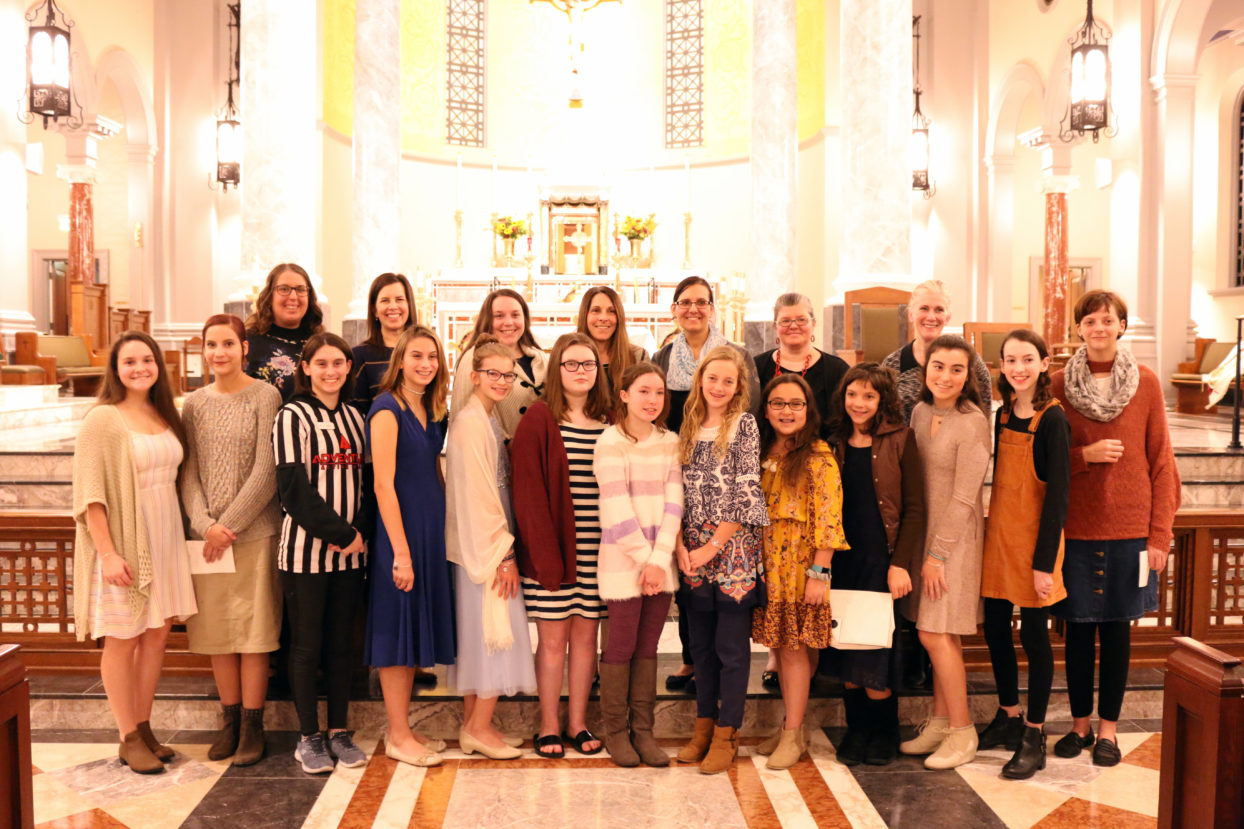
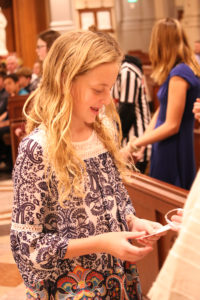
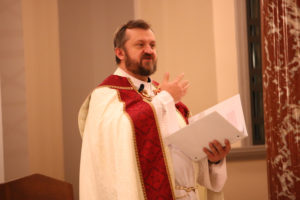
Comments 1
I am very excited about this. I have lamented for quite a while why we stopped teaching virtues to our young. This article placed more emphasis on what the boys are doing. I like the idea of using movies but what other resources are you using? Perhaps the Catholic Girl’s or Boy’s guide? While I do not have children, I would be interested in helping with supplies. I am in the process of moving there so I cannot volunteer at this time.